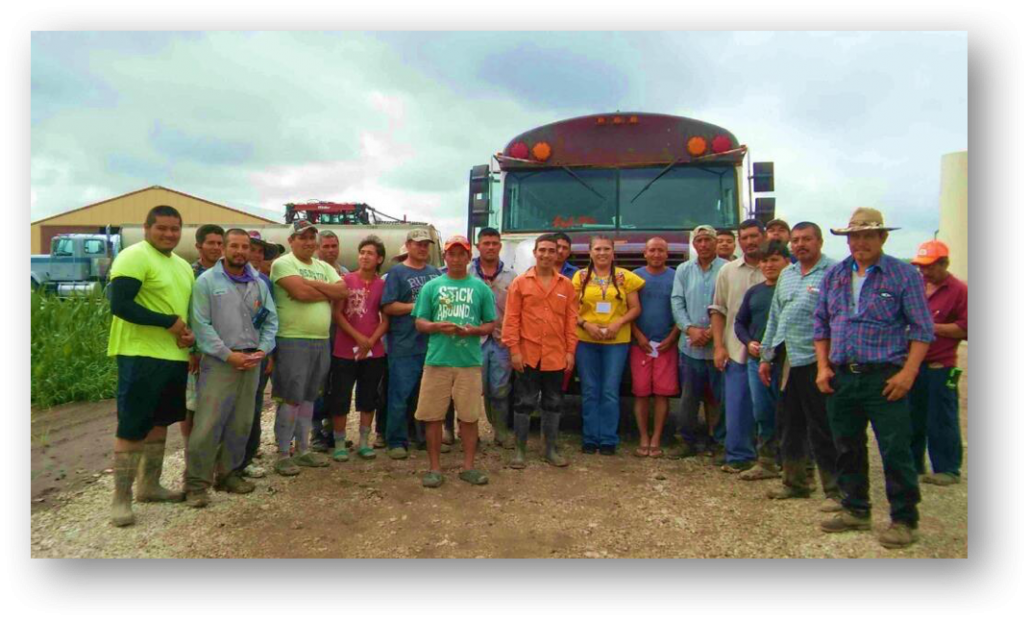By Daniel Sheehan
AFOP Executive Director
June and July have been an exceedingly busy time for the Association of Farmworker Opportunity Programs (AFOP) and its member organizations. As I type, the summer is already a third gone, and Congress and politicos, alike, have decamped to Cleveland, Ohio and Philadelphia, Pennsylvania for the political parties’ presidential nominating conventions, and the notorious heat and humidity of Washington, D.C. has settled in like a wet blanket. That hasn’t stopped the United States Department of Labor (DOL) from advancing its important work concerning the National Farmworker Jobs Program (NFJP), one the department’s best performing grant programs that brings life-changing change for the better to the nation’s migrant and seasonal farmworkers (MSFWs).
NFJP Grant Awards Announced
In late June, DOL announced the winners of the most recent NFJP grant competition, and I am proud to report that all AFOP member organizations won back their now four-year job-training grants. As some readers may know, NFJP is a competitive grant program through which DOL selects the most qualified and cost-effective service providers to give migrant and seasonal farmworkers job training and other supportive services. Estimates are that 2.5 million farmworkers live and work in the United States. Through NFJP, AFOP’s 53 member agencies provide access to training and supportive services to help farmworkers create better futures for themselves. It is a fiscally responsible program aimed at educating and training farmworkers into jobs that allow them to earn a self and family-sustaining income. The program is critically important because farmworkers face significant barriers to such employment: the average farmworker family of four earns less than $17,500 according to DOL, well below the poverty line of $24,250; on average, migrant and seasonal farmworkers earn between $10,000 and $12,000 per year; most farmworkers’ English language skills are very limited; and, tragically, more than half of migrant farmworker children drop out of school. In fact, among all farmworkers, the median highest grade completed is 8th grade, according to the National Agricultural Workers Survey.
Despite these challenges, AFOP members make NFJP one of the most successful job training programs operated by DOL. Over the past 10 years, more than 60,000 eligible farmworkers received quality training. Nationally, the program places over 88 percent of clients into well-paying jobs with access to a career ladder. In addition, more than four-fifths of those individuals keep those jobs for a year or more. The largest percentage of NFJP participants choose to enter the healthcare field or commercial truck driving professions. However, AFOP members also provide training and employment services for opportunities in other growing and locally viable sectors, including renewable energy, culinary arts, and a variety of positions in and outside of agriculture that provide good wages, benefits, and access to a career ladder.
DOL Makes Opportunity Act Final Regulations Official
Also in late June, DOL made available the final regulations for the 2014 Workforce Innovation and Opportunity Act (Opportunity Act). AFOP members have anxiously awaited release of these final rules after submitting extensive comments to DOL last year on its proposed draft Opportunity Act guidelines. After a transition, these new rules will entirely supplant the old rules promulgated in years past for the now obsolete Workforce Investment Act.
Under the new Opportunity Act final regulations, AFOP members will see the following highlights:
- While NFJP grantees are no longer required local workforce investment boards, they remain mandated one-stop partners in the areas they operate;
- Grantees must develop a memorandum of understanding (MOU) with all the local areas in which they operate;
- Grantees are responsible for coordinating services; particularly outreach to MSFWs with the state workforce agency and State Monitor Advocate;
- State Monitor Advocates must establish an ongoing liaison with NFJP grantees and other organizations serving farmworkers, and must enter into an MOU with the NFJP provider in their state.
- WIOA changed the definition of eligible seasonal farmworker to a low-income person who faces multiple barriers to economic self-sufficiency
- The definition of “farm work” expands the populations grantees can serve, including fish farming and hatcheries, logging and forestry operations, and individuals engaged in processing produce for storage prior to transportation to market; and
- On-the-job training (OJT) reimbursement rate to match that of the local area, up to 75 percent.
AFOP welcomes publication of these final rules, and looks forward to DOL issuing follow-on guidance, particularly in the matters of expanded MSFW eligibility.
Appropriations
Despite a solid effort by House and Senate Republicans over the spring and early summer to move the coming fiscal year’s annual appropriations bills forward, poison-pill policy riders and insufficient funding allocations combined to make it impossible to overcome opposition to these measures. In the Senate, Democrats again adopted a tactic that worked to their advantage last year that saw them filibuster all spending legislation until and unless the chamber’s leadership agreed to negotiate on unpalatable riders and inadequate funding levels. Those Democrats saw their strategy largely succeed when Congress negotiated a final spending package late last year.
Given that this year is a presidential election year, it was always perhaps a fool’s errand to seek enactment of the individual annual spending bills this year. That said, congressional appropriators, facing reality of a shortened legislative session because of the presidential nominating conventions, have turned to drafting a continuing resolution (CR) that will keep the federal government operating at current-year levels after the September 30 fiscal year-end. How long the CR will last is anybody’s guess, but it will be the focus of congressional leaders in September as they seek to wrap up legislative business for the year by month’s end to allow lawmakers time in their home districts to campaign for reelection. Some sort of catch-all spending package is likely to follow, either in December or March, depending on the federal election results.
AFOP is happy to report that both the House and Senate draft Labor Department funding bills include level funding for NFJP at $82 million, putting the program in a good position as negotiations over a final spending package commence later this year.
Meeting of the National Farmworker Alliance
On July 13, the National Farmworker Alliance (NFA) met at the Washington Hilton, with UMOS President and Chief Executive Officer Lupe Martinez presiding as chairman, to discuss pressing issues and challenges facing the nation’s farmworkers. In addition to Chairman Martinez, Jeff Lewis with PathStone Corporation attended the meeting, as did AFOP Executive Director Daniel Sheehan.
Much of the meeting involved the group trying to look into a crystal ball to best plan for the new president and his or her administration, and how future policies might affect farmworker programs. While uncertainty about the federal election results – from the White House, to the Senate, to the House of Representatives – was the take-away, the group did resolve to be ready to push for pro-farmworker policies and executive actions. Among those topics discussed were job-training, DOL Wage and Hour investigations and more stringent review of H2A requests, immigration reform, and others.
NFA will write a position paper for the incoming administration’s transition team. AFOP will be certain to share it with its membership once it is in final form. The group plans to meet next November 29, 2016 at the Renaissance Hotel here in Washington, D.C.
AFOP Continuing DOL NFJP TA&T Relationship
AFOP is happy to announce that the association will be continuing its role as DOL’s provider of technical assistance and training to the Opportunity Act Section 167 NFJP grantee community. AFOP Workforce Development Director Katy Nelson has been working closely with DOL NFJP Unit Chief Laura Ibañez to refine the scope of work for the cooperative agreement, and will have everything set to begin the new agreement year August 1.
In addition to this agreement, AFOP also serves as DOL’s partner in conducting the NFJP peer best practices sharing and review sessions. Katy continues to arrange in-person grantee-peer visits to help disseminate information to members about program best practices. If you have an interest in learning more about the peer-sharing program, please contact Katy directly at nelson@ afop.org.
AFOP Health & Safety Continues to Rock It
As many AFOP members know through their participation in the program, AFOP Health & Safety, with funding from the United States Environmental Protection Agency and the DOL Occupational Safety and Health Administration, facilitates Worker Protection Standard (WPS) pesticide safety and heat-stress prevention training for farmworkers and their families in 29 states. Through the end of June, Health & Safety has seen almost 16,000 migrant and seasonal farmworkers trained, 180 growers trained, and 31 trainers provided instruction on training farmworkers in the topic areas. With its network of 208 instructors, Health & Safety is confident it will meet and even surpass its goal of training 27,000 farmworkers this year. Congratulations to AFOP Health & Safety Director Melanie Forti and her team of Vashti Kelly, Juliana Hinton, and Tiffany Baker for continuing to do an excellent job for AFOP and its member organizations.
As the heat and humidity really settle in, we at AFOP join you in thinking about the many among us who labor this very day in our fields to deliver us the delicious and nutritious foods we eat, and commend those working through NFJP and other anti-poverty programs to allow these workers the opportunity to seek training, improve their lives, and share in the American Dream. To all involved in delivering the best darn NFJP possible, we at AFOP salute you.




